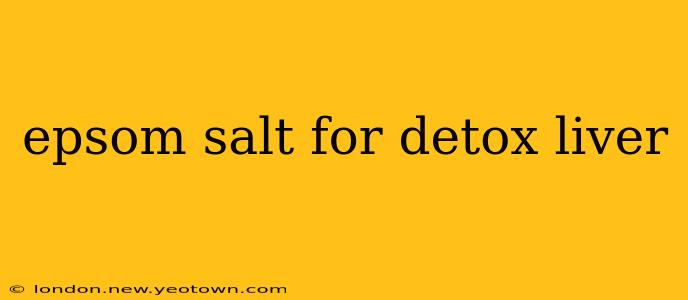Can Epsom Salt Really Detox Your Liver? Unpacking the Myths and Realities
The idea of a quick liver detox is alluring. We overload our bodies with rich foods, late nights, and stress, and the promise of a simple, natural cleanse feels incredibly appealing. Epsom salt, with its readily available and inexpensive nature, has become intertwined with these detox claims. But does it actually work? Let's dive into the science and separate fact from fiction surrounding Epsom salt and liver detoxification.
The truth is, there's no scientific evidence supporting the idea that Epsom salt, or magnesium sulfate as it's known chemically, directly detoxifies the liver. Your liver, a powerhouse organ, already possesses its own incredible detoxification system. It filters toxins from your blood, processing them for excretion through your kidneys and bowels. Thinking of it as a self-cleaning machine is more accurate than needing a "cleansing" intervention.
What Does Epsom Salt Actually Do?
Epsom salt's benefits lie elsewhere. It's primarily used for its magnesium content. Magnesium plays a crucial role in numerous bodily functions, including muscle and nerve function, blood sugar control, and blood pressure regulation. When absorbed through the skin (via a bath), it can provide a temporary boost of magnesium. However, this doesn't translate to liver detoxification.
Does Epsom Salt Help with Liver Health?
While Epsom salt doesn't detox your liver, supporting overall health can indirectly benefit liver function. Adequate magnesium intake contributes to overall well-being. A healthy lifestyle, rich in fruits, vegetables, and whole grains, alongside regular exercise, is far more effective in supporting liver health than any quick fix.
What are the Other Benefits of Epsom Salt Baths?
The soothing benefits of Epsom salt baths are well-documented. Many people find them relaxing and helpful for:
- Muscle soreness and pain relief: The magnesium in Epsom salt can help soothe aching muscles.
- Stress reduction: The warmth and relaxation of a bath can be beneficial for stress management.
- Improved sleep: Relaxation can lead to improved sleep quality.
It's crucial to remember these are indirect benefits and not a direct impact on liver function.
What are the Risks Associated with Epsom Salt Use?
While generally safe when used as directed, excessive Epsom salt use can have negative consequences. These include:
- Diarrhea: Ingestion of large quantities can lead to diarrhea.
- Dehydration: This is a risk, especially if you're not drinking enough water.
- Low blood pressure: In rare cases, excessive use can lead to dangerously low blood pressure.
How Can I Support My Liver Health?
The best way to support your liver health is through a holistic approach:
- Maintain a healthy weight: Obesity can put extra stress on the liver.
- Eat a balanced diet: Focus on fruits, vegetables, lean protein, and whole grains.
- Limit alcohol consumption: Alcohol is a major burden on the liver.
- Exercise regularly: Physical activity supports overall health, including liver function.
- Get enough sleep: Rest is vital for organ repair and regeneration.
- Hydrate adequately: Water is crucial for flushing out toxins.
Is There Anything Else I Should Know About Liver Detox?
The concept of "liver detox" is often misleading. Your liver is a tireless organ that constantly detoxifies your body. Focus on supporting your overall health instead of seeking quick fixes. If you have concerns about your liver health, consult a doctor for professional advice. They can accurately assess your situation and offer tailored recommendations.
In conclusion, while Epsom salt baths offer relaxation and may provide some magnesium benefits, they do not detoxify your liver. Focus on a healthy lifestyle and consult a healthcare professional for any health concerns. Remember, your liver is already doing a fantastic job!

